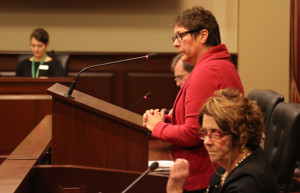The Senate Education Committee on Wednesday took its first look at some of the policy issues that could dominate the 2016 legislative session.

They heard from State Superintendent of Public Instruction Sherri Ybarra, state officials and the leaders of several education groups on a host of issues.
But what they didn’t hear much about was the Idaho Standards Achievement Test by Smarter Balanced, the so-called SBAC test aligned to Idaho Core Standards.
Concerns over the SBAC tests, first administered during 2014-15, have been ramping up on several fronts.
Last year, the Madison School District planned to opt out of administering the test before Gov. Butch Otter intervened and district leaders reversed course.
In September, 10 plaintiffs filed suit in U.S. District Court seeking to cease implementation of Idaho Core Standards and throw out the SBAC test.
Then, in November, Idaho School Boards Association delegates overwhelmingly voted to pass a resolution seeking to consider adopting an alternative test. The resolution, spearheaded by the Boise School District, states, in part, that ISBA should work with legislators and the State Department of Education staff to “to consider adopting other testing measures in lieu of the SBAC.”
After Wednesday’s meeting, ISBA Executive Director Karen Echeverria told Idaho Education News that she doesn’t see her organization bringing legislation to replace the SBAC this session. The ISBA will push seven bills this year, but none address the exam.
Echeverria said her group’s members still harbor concerns over the SBAC, specifically involving the length of time it takes to administer the test and whether test results are timely and useful.
But she pointed out that the state has two years remaining on its contract with the multistate assessment compact — the Smarter Balanced Assessment Consortium, the group that gives SBAC its name. Boise’s resolution allows ISBA and lawmakers two years to find a solution.
“We can’t get to the end of the SBAC (contract) and say, ‘Now what, what are we going to do?’” Echeverria said after the meeting. “We have got to have a solution by the time the contract ends.”
On Wednesday, Idaho Association of School Administrators Executive Director Rob Winslow briefly mentioned SBAC concerns when he outlined his organization’s priorities.
“The concerns that we are working on will be (ensuring the test is of) reasonable length and will it inform instruction,” Winslow said.
Echeverria told EdNews that it is still possible to salvage the existing SBAC. She said education groups and state officials have already started working on plans to improve the writing assessment.
On other topics, Echeverria said she is seeking “clarification” from lawmakers about a parental rights law passed last year. Echeverria said school districts have had to foot unexpected legal fees to respond to parental requests made under the new law.
For example, a parent demanded that a school offer courses that aren’t offered locally, even though district leaders offered to transport the child to another school that offered the courses.
In another case, parents attempted to block the release of all student data, even though some districts must submit some datasets to the state, and such data helps determine school funding levels.
Other parents demanded that their children not be taught anything under Idaho Core Standards, the statewide standards adopted by the Legislature and State Board of Education.
Echeverria said a simple amendment could clear up the law— one acknowledging the need to adhere to existing state laws and federal rules.
Education leaders offered praise Wednesday for Gov. Butch Otter’s recommendations to increase education funding, continue boosting teacher pay and to reverse recession-era cuts to discretionary budgets.
Echeverria said she was “thrilled about the budget.”
Said Ybarra, “I was so excited about the budget that I almost cried.”
The House Education Committee is scheduled to conduct its first meeting of the year at 9 a.m. Thursday.
